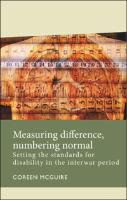Measuring difference, numbering normal
Setting the standards for disability in the interwar period
Abstract
Measuring difference, numbering normal provides a detailed study of the technological construction of disability by examining how the audiometer and spirometer were used to create numerical proxies for invisible and inarticulable experiences. Measurements, and their manipulation, have been underestimated as crucial historical forces motivating and guiding the way we think about disability. Using measurement technology as a lens, this book draws together several existing discussions on disability, healthcare, medical practice, embodiment and emerging medical and scientific technologies at the turn of the twentieth century. As such, this work connects several important and usually separate academic subject areas and historical specialisms. The standards embedded in instrumentation created strict but ultimately arbitrary thresholds of normalcy and abnormalcy. Considering these standards from a long historical perspective reveals how these dividing lines shifted when pushed. The central thesis of this book is that health measurements are given artificial authority if they are particularly amenable to calculability and easy measurement. These measurement processes were perpetuated and perfected in the interwar years in Britain as the previously invisible limits of the body were made visible and measurable. Determination to consider body processes as quantifiable was driven by the need to compensate for disability occasioned by warfare or industry. This focus thus draws attention to the biopower associated with systems, which has emerged as a central area of concern for modern healthcare in the second decade of the twenty-first century.
Keywords
disability; measurement; normalcy; quantification; technology; interwar; classification; standardisation; history; medical humanitiesDOI
10.7765/9781526143167ISBN
9781526143174Publisher
Manchester University PressPublisher website
https://manchesteruniversitypress.co.uk/Publication date and place
Manchester, 2020Series
Disability history,Classification
Social and cultural history
History of medicine
History of science


 Download
Download Web Shop
Web Shop